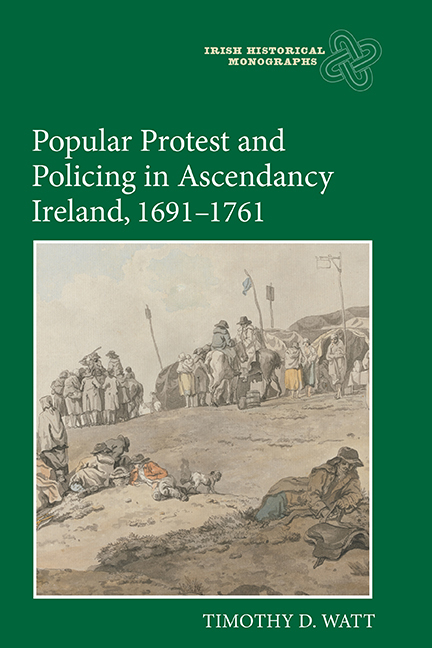Book contents
- Frontmatter
- Dedication
- Contents
- List of illustrations
- Acknowledgements
- Principal abbreviations
- Notes on conventions
- Glossary
- Introduction
- Part One Policing and large-scale disorder
- 1 Civil Law Enforcers in a ‘Self-policing’ Society
- 2 The Standing Army and Policing
- 3 Local Militias, Irregular Forces and the ‘Tory Wars’
- Part Two Popular Protest and Collective Action
- Appendix: Irish Combination Acts, 1705–80
- Bibliography
- Index
- Irish Historical Monographs previous volumes
2 - The Standing Army and Policing
from Part One - Policing and large-scale disorder
Published online by Cambridge University Press: 12 October 2019
- Frontmatter
- Dedication
- Contents
- List of illustrations
- Acknowledgements
- Principal abbreviations
- Notes on conventions
- Glossary
- Introduction
- Part One Policing and large-scale disorder
- 1 Civil Law Enforcers in a ‘Self-policing’ Society
- 2 The Standing Army and Policing
- 3 Local Militias, Irregular Forces and the ‘Tory Wars’
- Part Two Popular Protest and Collective Action
- Appendix: Irish Combination Acts, 1705–80
- Bibliography
- Index
- Irish Historical Monographs previous volumes
Summary
The civil authorities had primary responsibility for enforcing laws in Ireland. But given that the leaders of law enforcement were recruited mainly from the landed gentry, church and legal profession, they often lacked the competence and organisational know-how to confront large-scale violence. Authorities could call on additional means to enforce laws more effectively, including militias or scattered bands of ‘irregular’ law enforcers, but the most potent force was the army, which was composed of troops recruited mainly in Great Britain and paid for with revenue collected in Ireland.
This chapter examines how the regular army was used by Irish authorities to enforce laws, in particular to counter large-scale disorder in parts of the country where the level of violence was intolerable. Consideration is given initially to how a barrack-building programme in Ireland, which itself was a significant innovation in the late seventeenth century, was implemented by the Irish government in part so that troops could be used as a police force. By 1704 there were over one hundred stations constructed, either as residential buildings or redoubts, ‘in such convenient and necessary parts’ of Ireland as were deemed ‘most proper’ for the purpose. Thereafter the chapter examines the role played by the army in three periods of disorder: the ‘tory wars’ in Munster in the 1690s and early 1700s, the agrarian and penal law protests in Connacht in the early 1710s, and taxation protest in Ireland in the period between 1720 and 1760. It explores the complex and often incongruous relationship that existed between the army and local gentry. In the west of Ireland, where Protestants felt isolated and vulnerable to attack by tories and rapparees, the landed gentry usually considered the army to be the mainstay of its security. Yet, at times, the gentry felt oppressed by the presence of soldiers on their lands and apprehensive about the negative impact that troops had on relations between Catholics and Protestants. The chapter then considers the difficulties faced by local authorities in maintaining order in Connacht in the early 1710s, following an outbreak of agrarian disorder there and the subsequent decision of the Irish government to enforce more strictly the penal laws.
- Type
- Chapter
- Information
- Publisher: Boydell & BrewerPrint publication year: 2018

